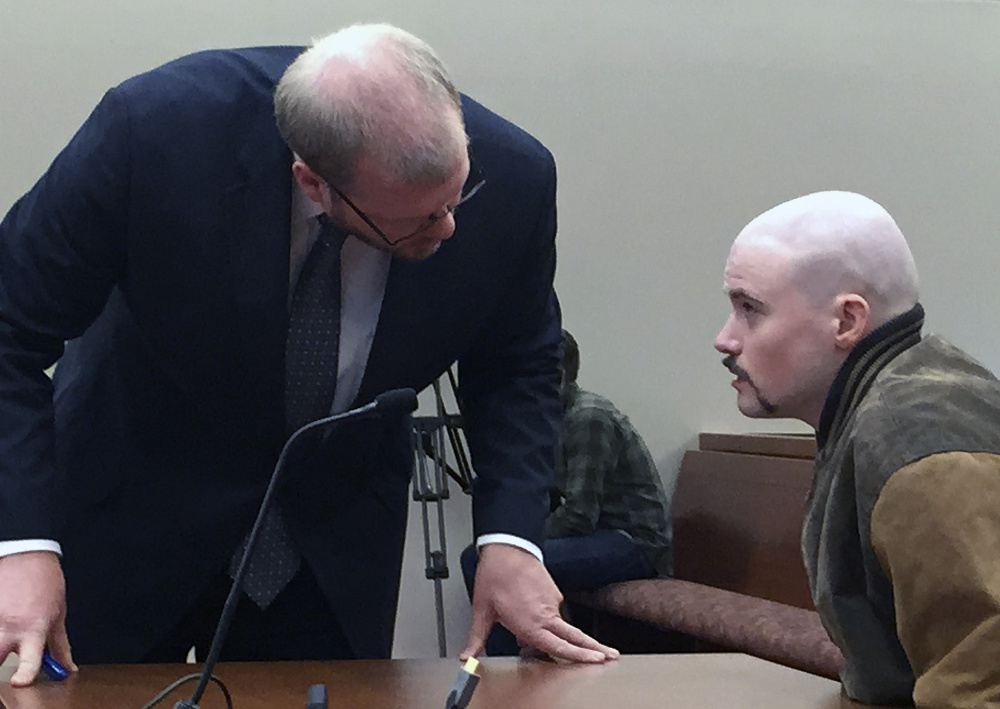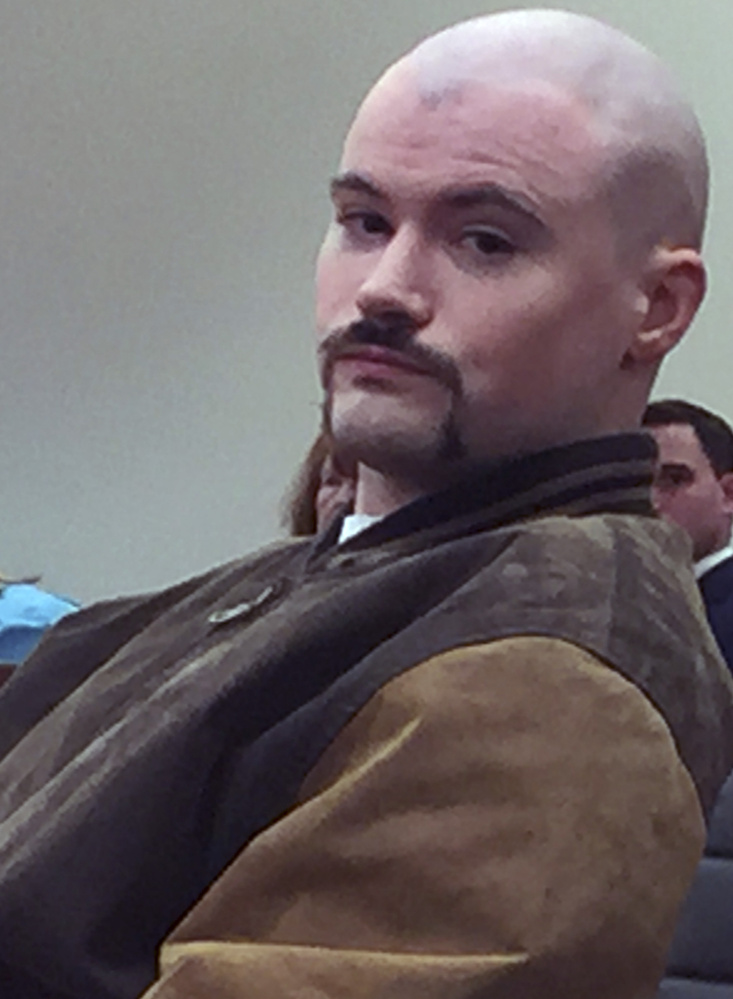AUGUSTA — More than two years after he was indicted on a charge of murder, Leroy Smith III on Thursday pleaded not guilty to killing his father in Gardiner in May 2014 after a judge found that he was mentally competent to enter a plea.
The decision by Justice Donald Marden to allow Smith to enter a plea, along with a second plea of not criminally responsible because of mental disease or defect, is a significant milestone in the case.
Following the passage of a 2015 law, Smith is the first person in Maine to be forced to take psychiatric medication, initially against his will, in an effort to restore his mental capacity to a level in which he can participate fully in his own defense.
The arraignment of Smith, 26, on the charge brought two years ago, capped a hearing lasting more than three hours Thursday at the Capital Judicial Center. During testimony, psychologists said Smith now is claiming that he believed his father was putting rat poison in his food, so he was forced to kill him in self-defense. Previously, Smith told officials that his father sexually assaulted him, which led to the crime.
Marden said he wanted to protect Smith’s constitutional rights and recognize the state’s interest in prosecuting the case. Smith is accused of stabbing to death and dismembering his father, Leroy Smith Jr., 56, and distributing the body parts in the woods in Richmond.
Marden asked Smith a series of questions as Smith stood at a microphone next to defense attorney Pamela Ames. Marden asked whether Smith understood the charge, and his right to a trial by jury as well as the consequences of the various pleas that could be entered.
Smith said he did, saying “That is correct” to most of them.
Smith asked a question of his own: “At any point am I allowed different lawyering staff?”
Marden said that would be possible if the attorneys are unable to represent him properly. However, Marden also told Smith that he has to have an attorney and that his attorneys have an obligation to bring forward their client’s concerns.
Smith has tried previously to fire his attorneys.
Smith wore a short-sleeved black T-shirt in the courtroom with the saying “Fire with or against you — and so it burns,” which is a song lyric from the Norwegian metal band Dimmu Borgir.
He was shackled and brought into the courtroom by deputies with the Kennebec County Sheriff’s Office. His head is shaved and he has a short dark beard and mustache.
Until he moved to the lectern, he sat at a table in the courtroom behind his two defense attorneys, Ames and Scott Hess.
The prosecutor, Assistant Attorney General Donald Macomber, told the judge on Thursday the state would not contest a finding of “not criminally responsible” for the murder. But Macomber also added that if Smith is found guilty at trial, “the state will not be recommending a sentence as short as 30 years.” The penalty for murder in Maine is a minimum of 25 years in prison and the possibility of life in prison without parole.
A finding of not criminally responsible would place Smith in the custody of the commissioner of the Department of Health & Human Services and result in his being placed at Riverview Psychiatric Center for treatment.
Marden also continued for another six months the order that allows the Riverview staff to medicate Smith forcibly in an attempt to restore his competence. Two psychologists and a psychiatric nurse practitioner testified that they have seen improvements in Smith’s mental abilities now that he has been on medication since January.
Six months ago Marden ordered involuntary medication for Smith in an attempt to restore his mental status enough to face the murder charge.
Miriam Davidson, a psychiatric nurse practitioner who sends weekly progress reports on Smith, said he had been on Zyprexa, an antipsychotic medication, beginning in January; but because of side-effects — most notably a weight gain of 38 pounds — he had been switched to Haldol in May.
During Thursday’s hearing, clinical psychologist Peter Donnelly testified about his June 20 evaluation of Smith and several prior ones.
Donnelly said Smith believed his father, a 56-year-old who worked construction and played guitar, was putting rat poison in his food, so he killed his father in self-defense.
Smith has been diagnosed with delusional disorder, and Donnelly summarized some of Smith’s delusions.
“He has a belief that, starting many years back, that he was destined to be a famous rock star; he was destined to be educated by well-known guitarists,” Donnelly said.
Donnelly said that Smith has said he is the God of the kingdom of heaven, Icarus, and that at a Phish concert people put a gun to his head, that there was an affiliation with Slayer and Slipknot, both thrash metal bands, and that Smith was warned somehow that his father was going to poison him with rat poison.
However, Donnelly also said, “There’s been an absence of the more grandiose aspects of his delusions since he started his medications.”
Donnelly also said Smith understands that other people who hear his story might find it hard to believe.
“He’d like to have his day in court,” Donnelly said. “He believes it occurred, and he knows it doesn’t sound rational.”
Donnelly said the younger Smith did not approach police with his concerns about being poisoned because he distrusts the government.
At one point, the Secret Service apparently warned Smith after questioning him about threats he allegedly made against President Barack Obama.
According to information in an affidavit by Maine State Police Detective Jonah O’Roak, who sought the original arrest warrant, the younger Smith told case investigators he killed his father and then “filleted him and buried him in the woods because his dad sexually assaulted him his whole life.”
There was no record of Leroy Herbert Smith Jr. on a sex offender registry in the United States, and the younger Smith had lived in Massachusetts until moving in with his father not long before the slaying.
Smith also said he rented a carpet steamer to help clean up the blood. At a hearing five days later, the younger Smith claimed to be a political prisoner.
On Thursday, a second psychologist, Ann LeBlanc, director of the State Forensic Service, which evaluates defendants for the court, testified that Smith has had delusions about the poisoning by his father in the Gardiner apartment they shared, saying the younger Smith believed his father was poisoning the wheat grass the younger Smith ate, as well as sprinkling rat poison on his food.
“He believes that he has no mental illness,” LeBlanc said, in response to a question by Ames. LeBlanc also said, “People with delusional disorder are regularly found competent.”
Smith watched attentively as each witness testified.
In January 2015, Marden found that Smith was mentally incompetent to assist his attorneys in defending himself on the charge of intentional or knowing or depraved indifference murder.
Late last year, the prosecutor sought the involuntary medication order under a state law that went into effect in July 2015. That law allows a judge to order that a defendant be medicated involuntarily in an attempt to restore competence.
Marden granted the motion for involuntary medication in January, and after status conference in May, attorneys said that Smith was willingly taking the medication.
On Thursday, Marden said, “I compliment Mr. Smith for cooperating fully with the doctors and psychologists in that regard.”
Betty Adams — 621-5631
Twitter: @betadams
Send questions/comments to the editors.





Success. Please wait for the page to reload. If the page does not reload within 5 seconds, please refresh the page.
Enter your email and password to access comments.
Hi, to comment on stories you must . This profile is in addition to your subscription and website login.
Already have a commenting profile? .
Invalid username/password.
Please check your email to confirm and complete your registration.
Only subscribers are eligible to post comments. Please subscribe or login first for digital access. Here’s why.
Use the form below to reset your password. When you've submitted your account email, we will send an email with a reset code.